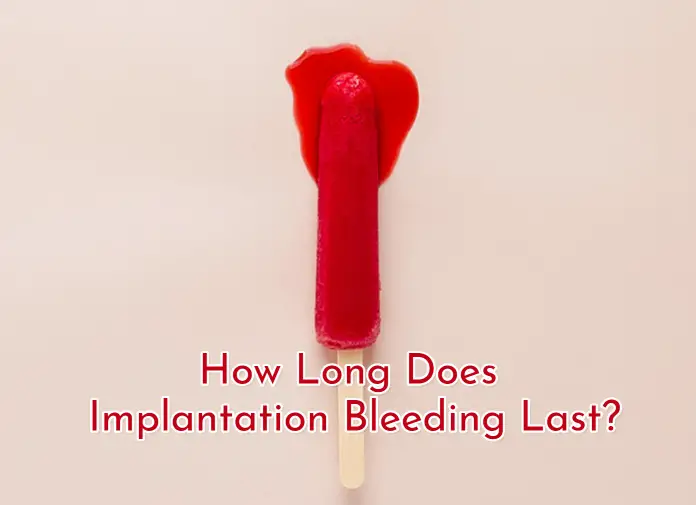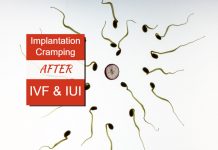Is it Implantation Bleeding Or Period Or Disease?
Implantation bleeding, period or disease are the three main categories for mid-cycle bleeding. A woman expects to see blood coming from her vagina when her period is about to start. Any other bleeding is not normal. Unless she knows about implantation bleeding and is trying to get pregnant, she will not understand whether it is implantation bleeding or period or disease.
Blood coming from vagina due to any reason looks and feels the same. There are limited symptoms of implantation. Implantation is essential for normal pregnancy. If it is not successful then your pregnancy will not continue to be in a healthy state.
It is important to know whether it is implantation bleeding or period or disease in order to take necessary action.
If you take it as period then you will delay detecting pregnancy by one month when you will not have either.
Taking painkillers or using any pH altering soaps because you think that the mid-cycle bleeding is because of a disease can lead to pregnancy loss.
Implantation is the trickiest stage and can lead to early miscarriages or pregnancy abnormalities.
Ectopic pregnancy is a result of a defect in implantation which causes attachment of the embryo to the inside of tubes. A chemical pregnancy is due to many reasons including implantation failure.

What causes bloody discharge mid cycle?
Not many reasons exist for bloody discharge mid-cycle Vaginal bleeding is not a normal event and mostly happens only while period.
Vaginal bleeding after sex is also not normal and bloody discharge before period is mostly a sign of disease. But if a woman is trying to get pregnant then she has another possible reason for mid cycle bleeding and that is implantation.
Implantation is the egg embedment step that occurs after conception. The embryo needs nutrition and a way for passing out waste. The development has to start forming layers ectoderm, endoderm and mesoderm. It needs to become static at one point and then move ahead with the growth.
The human reproductive event of fertilization occurs in the fallopian tubes. After thirty hours the fertilized egg divides into two. While repeated divisions it keeps moving down and finally on the sixth day reaches the endometrial lining.
Implantation occurs during the time period between 7-12 days after ovulation or conception. Ovulation and conception differ only by 24 hours. This is because the human egg stays viable for 24 hours. If sperms are present in the vagina during ovulation then fertilization may occur. There is no surety in any case and it is partially luck or destiny dependent.
When the egg reaches the endometrial lining it is a 64 celled blastocyst. It implants by making space in the uterus lining. This leads to bleeding from the smaller capillaries. The blood stays in the vagina and later comes out as brown spotting.
Implantation bleeding can be brown, pink or even orange. But it is not bright red or heavy and lasts for only two days at most.
Illness with implantation symptoms
Implantation symptoms like nausea and cramping are common to many other disease. Illness with symptoms of implantation can be because you are unnecessarily relating it. The symptoms of implantation apart from spotting are very general. They happen in case of disorders that are not even related to the reproductive system.
Cramping can be because of stomach upset or constant vomiting. Nausea can happen just because you have been travelling or were in a close room.
There are some major diseases that have implantation like symptoms. If you have intense cramping near you vagina and bleeding then it may be because of these reasons.
1) Cervical infections
Cervical infections happen every once a while to most women. Douching and using scented soaps is the biggest reason for it. If you use cologne or powders near your cervix then it can alter the bacteria present there. The balance of bacteria is essential for maintaining the pH of the region. Yeast infections are very common amongst women. Cervical infections make the cervix very sensitive. It can start bleeding due to any rub or vigorous touch. Symptoms like cramping and rashes are first signs of cervical infection. Cervical mucus during ovulation is stringy and it keeps the area wet. If you don’t take proper care and use tampons at that time it can aggravate infectious fauna. During spotting of any kind avoid using tampons and having sex.
2) Hormonal changes
Hormonal changes happen in many situations. When you switch to a birth control pill the hormonal cycle takes a toll on your body. The ruckus of hormones is damaging and causes spotting. If this happens near the time before period you may doubt pregnancy. But before period hormones fluctuate a lot and can cause spotting. Bleeding from vagina happens because of hormonal changes. Illness like symptoms can be a result of abnormal hormone balance.
3) Sexually transmitted diseases
Most STDs have rashes and bleeding as one of their symptoms. Genital rashes can bleed because of touch and tight undergarments. Sexually transmitted diseases are easily caught if you don’t use condoms. Any contraceptive device other than a condom doesn’t offer protection from STDs. Cheesy discharge from vagina or green mucus with odor are signs of STDs. You need to tell your doctor about such symptoms because STDs can lead to infertility in men and women.
4) Stress and anxiety
Stress and anxiety are silent killers. Unlike other disorders, you don’t come to know about the damage incurred by stress. It can cause implantation symptoms like heavy head and weakness. You may feel tired even when you physically did not move an inch. Stress can even affect you fertility and cause spotting from the vagina.
5) Trauma
Any jolt or vigorous sex can cause bleeding from the vagina. Implantation bleeding is not painful. Traumatic bleeding from the vagina is heavy and occurs soon after the incident. There is no relation with the arrival of the period. If you met with any accident that hit you near your abdomen you need medical treatment. Internal hemorrhage leads to bleeding that may stay within for days. Later it will come out as brown discharge.
The only normal physiological condition which has similar symptoms of implantation is ovulation. You can be ovulating late due to many reasons like illness. You can use an ovulation kit for detecting ovulation.
Causes of bleeding during the first two weeks of pregnancy
Even after you take a pregnancy test you may continue to bleed. During the first few weeks of pregnancy, spotting is normal. Spotting during pregnancy may continue throughout the entire duration. There are many causes of bleeding during the first two weeks of pregnancy. Some of them need medical attention and that depends on the amount of blood and intensity of accompanying symptoms. The cervical region becomes very sensitive during pregnancy. Pap exams can cause bleeding from the vagina during pregnancy.
1) Threatened miscarriage
Bright red blood during the first two weeks of pregnancy is a sign that you are at higher risk of miscarriage. Even pregnancy is prone to miscarriages but threatened miscarriage means that you are more likely than others. A threatened miscarriage is a stage where a miscarriage can be stopped. Shortness of breath, chest pain and heartburn are signs of threatened miscarriage.
2) Placenta defects
Placenta Previa is the condition when the tissue comes out form the cervix. This is fatal for the developing embryo. Low lying placenta cases require complete bed rest during nine months. If you continue to leak blood from the vagina during the first two weeks of pregnancy then it may be a sign of placenta defect.
3) Cervical examination
Any cervical examination for bacterial vaginosis or yeast infection can cause bleeding from the vagina. During such examination, the doctors insert instruments inside the cervix. Irritation of the inner walls causes implantation like spotting. It will happen for sometime after the cervical examination.
4) Early miscarriage
A majority of pregnancies terminate prior to implantation. Pre implantation failures lead to very early miscarriages. If you have heavy bleeding then what you are taking as period may be a miscarriage.
5) Chemical pregnancy
A chemical pregnancy is when a woman is only having the factors in her blood that declare her pregnant. It feels like a normal pregnancy and later on starts bleeding. There is no way to stop a chemical pregnancy.
6) Tubal pregnancy
When implantation does not occur inside the womb then it is a tubal pregnancy. In that case, the embryo attaches to the wall of the fallopian tubes. Tubal pregnancy causes extreme cramps that get worse. If you don’t get it treated then you will have to sacrifice your fertility. The later stages of ectopic pregnancy demand the complete removal of tubes.
7) Molar pregnancy
When the tissue that was to become an embryo turns into mass it is Molar pregnancy. This happens due to genetic defects. When a sperm fertilizes an empty egg it causes a molar pregnancy.
8) Progesterone deficiency
After conception, the placenta formation causes a rise in Progesterone. This prevents menstruation and makes the lining stay in place. Progesterone is the pregnancy hormone and is essential for maintaining it. If there is a deficiency of progesterone then it can cause bleeding and miscarriage. Progesterone supplements might work to stabilize the condition. But you have to consult your doctor before taking any hormonal pill.




![Implantation Bleeding With Twins [How long does IB last with twins?] Implantation Bleeding With Twins](https://www.pregnanteve.com/wp-content/uploads/2019/01/implantation-bleeding-with-twins-218x150.jpg)




